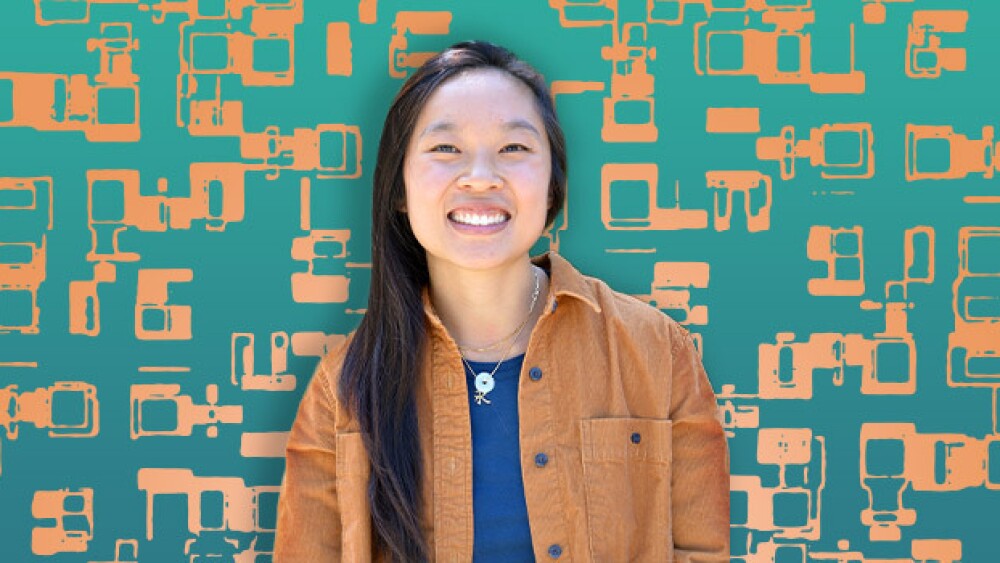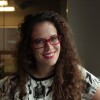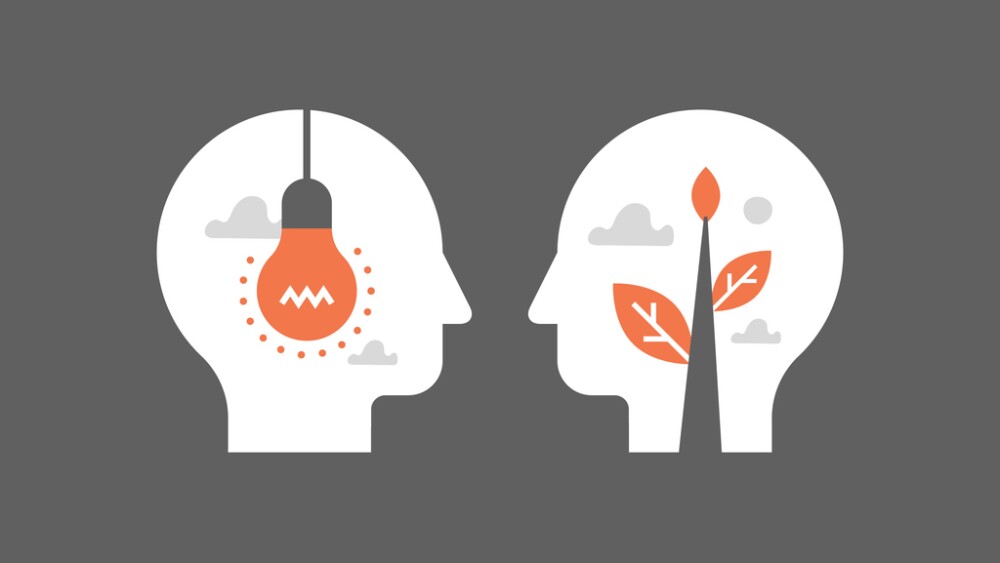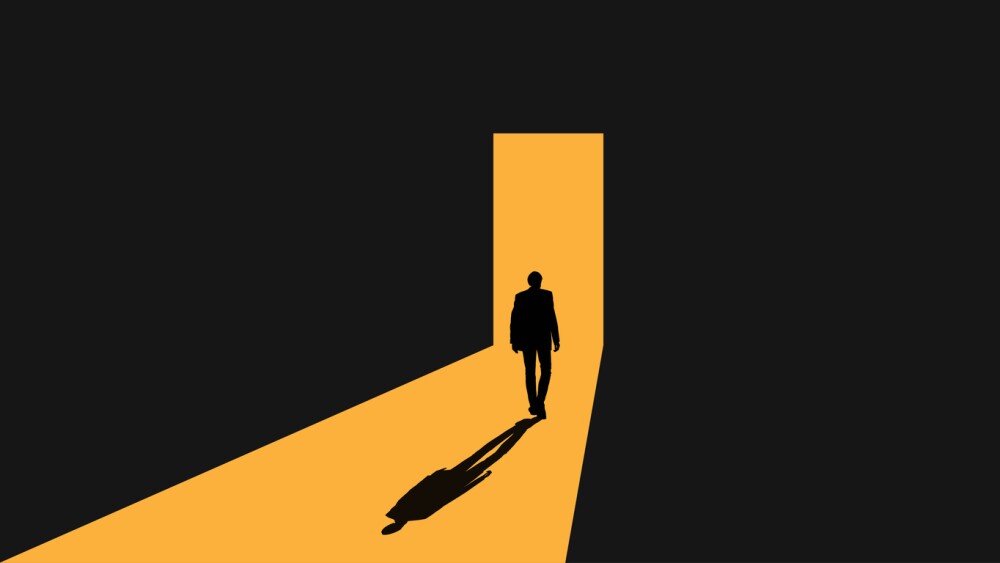The Interface Biosciences co-founder said forging the relationships needed to launch a startup can be a challenge for members of underrepresented groups, making confidence and adaptability key.
Pictured: Hannah Wastyk/Background by Nicole Bean for BioSpace
Hannah Wastyk was born in Jiangxi, China, and grew up with her adoptive parents in a small town in Pennsylvania. She grew up wanting to be a doctor, and had her first job in a cancer research lab during high school. That experience led to her being the first student at her high school to participate in a regional science fair, which she won. She took her project to an international fair, winning first prize in the molecular biology category and third overall. As a result, she was able to attend the Nobel Prize conference in Sweden in 2013, an experience that solidified her burgeoning desire to work in biological research. She got her undergraduate degree in biochemistry at the University of Delaware, then headed to Stanford for graduate school.
During her third year in graduate school, a fellow PhD candidate, Will Van Treuren, asked Wastyk to start a company with him. That was the beginning of what is now known as Interface Biosciences, which is building an AI-enabled, metabolomics-based drug discovery engine for inflammatory disease. Wastyk didn’t know anything about startups at the time, so she borrowed the book Zero to One: Notes on Startups, or How to Build the Future and read it over winter break. She had always envisioned herself going into academia, but that winter, she reconsidered the impact she wanted to have.
At Stanford, Van Treuren was building the very tools Wastyk had been waiting to use to find out how the microbiome and chemical language of its bacteria can be used to develop next-generation therapeutics.
“It really was a perfect marriage there . . . his tools and then my vision,” Wastyk said. “With the company, we could really go out there and try to make these therapeutics [and] use this technology for an application that would change the world. And I felt like we had a better chance of that in going out and start[ing] a company than staying in academia.”
But stepping out of the lab at Stanford and into the biotech venture capital world, Wastyk, a 28-year-old queer Asian-American woman, had to learn quickly how to command rooms where people who looked like her were not the majority.
The Heavy Weight of Representation
In 2023, companies founded solely by women garnered just 2% of the total capital invested in venture-backed startups in the U.S., according to a Pitchbook report, while startups with both female and male co-founders—like Interface Biosciences, of which Wastyk is CEO—doing only slightly better at 20.7%.
“There’s a lot of women at Stanford, and there’s a lot of Asian women at Stanford,” Wastyk said. “I didn’t feel like a minority in that way as acutely as I did in pitch rooms and with venture capitalists.”
In a January 2023 Substack post, Wastyk documented the pressure she felt:
I was overwhelmingly surrounded by white men whose sole job was to judge me on the validity of my ideas and ability to make them money.
Every day I feel the weight of representing women and proving we have what it takes to be successful.
Every day I feel the weight of representing Asian Americans and proving we have what it takes to be successful.
Every day I feel the weight of representing queer folks and proving we have what it takes to be successful.
Every day I feel the weight of representing adoptees and proving we have what it takes to be successful.
“There were times when I would pitch the entire company and then all of the questions would be directed to my co-founder, who’s a white man,” Wastyk said. “That was challenging. I had to learn very quickly to command respect.”
Biotech venture capital, and venture capital as a whole, is a largely relationship-focused industry, Wastyk said. Having things in common, including shared identities like race and gender expression, can make it easier to form those relationships. Wastyk recalled a time when she pitched to a group of women venture capitalists and said she wondered why it felt so easy. Then it hit her: This is probably how it feels when you have an identity in common with the people you’re pitching to.
“That rapport just comes really, really quickly,” she said. “That doesn’t necessarily mean it always translates to deals. . . . But being able to create that rapport so quickly with almost every single meeting that you’re in—the chances of it converting to a deal is much higher.”
A Business Chameleon
Wastyk thinks of herself as a chameleon. And while she said that identity grew out of necessity, she sees it as giving her an edge in business. “This is something that I’ve had to do my entire life,” she said. “Being in spaces where I’m pretty much always the minority, [I’m] good at adapting and can adapt to the mannerisms and the values that people are speaking to.”
After delivering as many as eight pitches a day over Zoom to investors during the pandemic, she learned firsthand the truth of the age-old saying “confidence is key.” In graduate school, she noted, the approach is to look at the world as if you don’t know the answer to a research question and refrain from making blanket statements. But in business, investors want to hear sureties, a change in presentation style she described as “whiplash.” Yet she sees that confidence as earned, since “Really, when you come out of your PhD, you kind of are the expert in that domain, at least for a couple of years, because no one goes as deep as you go.”
Wastyk said she conducts herself with command in every pitch she delivers, and it’s a practice that has paid off. As CEO she helped win $3 million in seed funding for Interface Biosciences in late 2023 despite a tough investing environment.
“You want to have the confidence that what you’re doing is going to change the world, and that you are the only people that can do it,” she said.
But her attitude has shifted a bit since last January’s Substack post. While she used to be afraid of failing, Wastyk said she now views failure as the expectation, as successful drug development is not the usual outcome. This gives her freedom to do good science, she said, because now she’s not afraid to try things that she thinks will work and adjust from there.
“Business is the most tolerant to failure field in the world,” she said. “Failure doesn’t mean you’re going to be a failure forever.”
For now, her priorities in building her company are defining her values, focusing on building up her employees and “protecting these people so that we can do the best science possible for as long as we possibly can.”
Mollie Barnes is a freelance science writer based in Los Angeles. Reach her at mollie@100yearsco.com. Follow her on Threads and Instagram @shejustlikedtogo and see more of her work at molliebarnes.contently.com.






